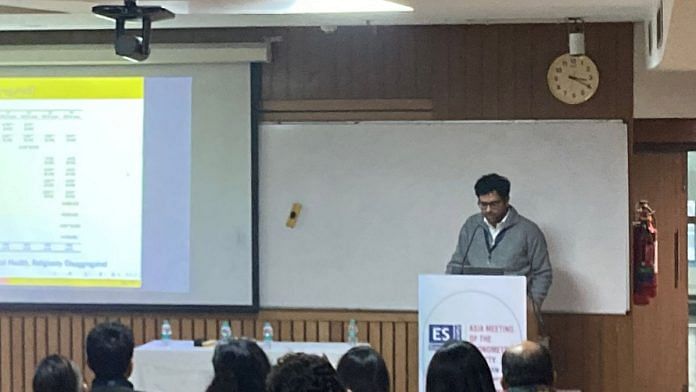New Delhi: The pandemic has been analysed from every possible angle – health, economic, sociological, governance, and geo-politics. Now comes a paper that looks at the role of religion in how people coped with the troubled times.
And it uses mathematics to study the phenomenon.
It’s well-documented that the Covid-19 pandemic triggered a surge in mental health problems like anxiety and depression. But a paper published in the European Economic Review in November 2023 argues that this negative effect was significantly mitigated for people who participated in religious activities.
Co-authored by Girish Bahal, Sriya Iyer, Kishen Shastry, and Anand Shrivastava, the paper was presented at the Asia Meeting of the Econometric Society (AMES-CSW) 2024, held at the Indian Institute of Technology, New Delhi, last week. Although the study was based on an online survey of 5,178 individuals in the United States, it purports to provide broader insights on the intersection of religion and mental health.
Presenting the paper at the conference, co-author Shastry said that the “intensity” of a person’s religiosity and their access to religious services, whether physical or online, during the pandemic were correlated with mental health.
“Engagement in a religious congregation and the intensity of that engagement—especially the idea that one could meet up for get togethers—aids in mental health,” Shastry said.
However, the roughly 30 students and academics in attendance, including conference chair Sanjeev Goyal— a professor of economics at the University of Cambridge—seemed sceptical.
The study’s conclusions about “religiosity” were hotly contested, with audience members arguing that any strong community engagement could have similar effects.
“Could hanging out with a large group of friends have the same effect as those that participated in religious congregations?” a member of the audience asked Shastry. “Maybe even if one could map out their large number of friends and spend time with them, it could have (the kind of) positive effect that is being pointed out in the paper.”
Also Read: Stop fighting over Hindi vs Urdu. Hindustani is the answer, says Javed Akhtar
Questions on applicability
At the beginning of the presentation, Shastry explained that 90 per cent of the respondents, surveyed between February and March 2021, were Christians from various denominations.
This, too, sparked discussion. Questions arose about replicating the study’s findings in diverse cultures with distinct religious systems, particularly Hinduism and Islam.
During this exchange, an audience member pointed out that Hindu religious practices don’t typically feature the “congregations” seen among US Christians. Given this, he asked, could the findings of the study be replicated in India?
Here, Shastry intervened, clarifying that the study has nothing to do with individual “spirituality” but focuses only on the attendance of religious events and “religiosity”.
Also Read: Everyone wanted Ram temple, except Nehru—Balbir Punj promotes book Tryst With Ayodhya
Faith or friends?
Most of the conference participants seemed bothered by one question: why did the authors focus on individual “religiosity” while essentially making an argument about the benefits of “community engagement” during the pandemic.
Some audience members offered different examples of “community engagement”, like congregations of football fans, which could offer similar levels of support and engagement as religious services. Another participant questioned the narrow focus on “religiosity”, suggesting any consistent interaction with a large community could perhaps contribute to better mental health.
In response to these arguments, Shastry explained: “Religion was chosen because it is better at coordinating community engagement. It’s more accessible, exists everywhere, and has larger numbers of active participants.”
This, Shastry added, was why it made “sense” to study the “correlation between participation in religious activities and mental health”.
Gursidak Gagneja, a student at IIT-Delhi who was present at the conference, praised the presentation, but also drew attention to the broader community factor. “It was a very nice presentation made by Kishen Shastry. He explained how our religious commitments will decrease our mental stress— when we mobilise in a group for our betterment or for a good thing,” he told ThePrint.
Shastry conceded, agreeing that “perhaps” similar benefits could be experienced by individuals involved in non-religious community activities.
(Edited by Asavari Singh)




Man being a social animal will suffer from anxiety and depression if anyone remains isolated, which happened during pandemic situation. There was no scope for group activity either religious or nonreligious . In normal time any group gathering with entertainment will keep the person in a healthy mental state.